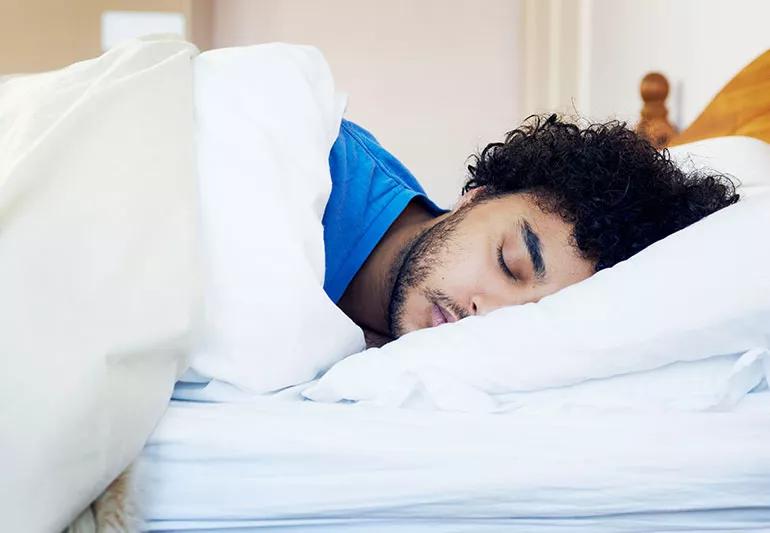The scoop on sleep supplements and sleeping pills

Image content: This image is available to view online.
View image online (https://assets.clevelandclinic.org/transform/461003c7-23ab-42a3-af54-450a454a8eea/SleepAidsMelatonin-163391560-770x533-1_jpg)
man trying to sleep in bed
It’s late. It’s dark. You’re tired. (So tired.) So why – why – are you still staring at the ceiling, wide awake?
Advertisement
Cleveland Clinic is a non-profit academic medical center. Advertising on our site helps support our mission. We do not endorse non-Cleveland Clinic products or services. Policy
If you’re experiencing insomnia, a pill to make you sink into dreamland sounds like magic. Drugstore shelves are lined with medications and supplements that promise a good night’s sleep. But do they work? And are they safe?
Family medicine doctor Matthew Goldman, MD, gives us the lowdown on common over-the-counter sleep aids.
Both diphenhydramine and doxylamine are antihistamines, medications that are often used to fight allergies. But diphenhydramine and doxylamine are part of a family of antihistamines that can act on your central nervous system and have a sedating effect. In other words, they can make you sleepy.
You can find diphenhydramine and doxylamine in many over-the-counter sleep aids. Diphenhydramine is the snooze-inducing ingredient in drugs like:
Doxylamine is found in products such as:
These drugs affect people differently. Some have few side effects while others aren’t so lucky. “Older patients are often more sensitive to side effects, so they should limit or avoid using these products,” Dr. Goldman says. Possible side effects include:
Advertisement
Call your doctor immediately if you have these serious side effects:
Follow the dosage instructions on the package and don’t mix the drugs with alcohol or other sedatives. Also, don’t take these drugs night after night. “These medications aren’t recommended for chronic insomnia, but they can help if you’re occasionally having trouble falling asleep,” Dr. Goldman says.
Melatonin is a hormone your brain makes. “Melatonin regulates your sleep-wake cycle,” Dr. Goldman explains. “The amount made by your body normally peaks at night, which causes you to feel sleepy.” If you’re having trouble sleeping, melatonin supplements might send you off to dreamland.
Melatonin isn’t linked to major side effects, Dr. Goldman says. But there’s some evidence it may cause:
In the United States, you can buy melatonin as a dietary supplement. The typical dose can range from 1 milligram to 10 milligrams. If you’re trying it for the first time, Dr. Goldman recommends starting with 1 milligram or even splitting a pill in half and taking just 0.5 milligrams.
Once you see how it affects you, you might gradually increase your dose. “Talk to your healthcare provider to determine the right dose for you,” he says. “But in general, starting low and going slow is the best way to go for all medications and supplements.”
Melatonin is best for short-term treatment of insomnia. It’s also helpful for reducing jet lag when traveling and can help people who do shift work fall asleep at irregular hours. “It’s a safe choice, but don’t use it for more than three months at a time,” Dr. Goldman says.
Valerian is an herbal supplement made from dried roots. It contains compounds that may act on receptors in the brain, potentially slowing down the nervous system and making you drowsy. “But it’s not completely known yet how valerian root works,” Dr. Goldman says. And it’s not a sure thing. Research studies testing how effective valerian is for insomnia have had mixed results.
There are few reports of serious side effects from valerian, aside from feeling drowsy (a good thing if you’re taking it for insomnia). But some people may experience dizziness, Dr. Goldman says.
Valerian is sold as a dietary supplement in tablet and capsule form. Follow the dosage instructions on the bottle. And like melatonin, it’s a good idea to start with a low dose. Since it’s a sedative, valerian could, in theory, slow down your breathing, Dr. Goldman adds — especially if you combine it with other medications. “Talk to your healthcare provider first, and avoid taking it with alcohol or other sedatives,” he says.
Advertisement
If you have an occasional sleepless night, over-the-counter sleep aids can be a helpful short-term fix. But if insomnia is a regular thing, there are better strategies.
Dr. Goldman offers these tips to set yourself up for slumber success:
It might take some effort to turn your insomnia around. But it’ll be worth it when you wake up bright-eyed and bushy-tailed after a deep, restful slumber.
Advertisement
Advertisement

Sign up for our Health Essentials emails for expert guidance on nutrition, fitness, sleep, skin care and more.
Learn more about our editorial process.
Advertisement
Sleep masks can help you create total darkness so you can sleep better
To avoid sleep deprivation and shift work sleep disorder, try adopting habits that minimize light exposure and prioritize daytime sleep
Sleep disorders, mental health conditions and other health concerns can all affect the quality of your sleep
Most people fall asleep within 10 to 20 minutes, but if your experience is different, adjusting your sleep schedule may help
Stick to a consistent schedule, be mindful of screen time and work on reducing your stress levels before bed
Napping can boost focus, memory and mood — if you time it right
These devices can help shed light on what’s happening with your body during rest
Keep a dream journal, set your intentions before bed and make sure you’re getting a full night of high-quality sleep
Prioritize your health by managing stress, strengthening your social connections and getting quality sleep
Bolsters, blankets, pillows and blocks can offer extra support, stability and comfort
Allergies, postnasal drip, asthma or reflux could be to blame for a cough that won’t quit